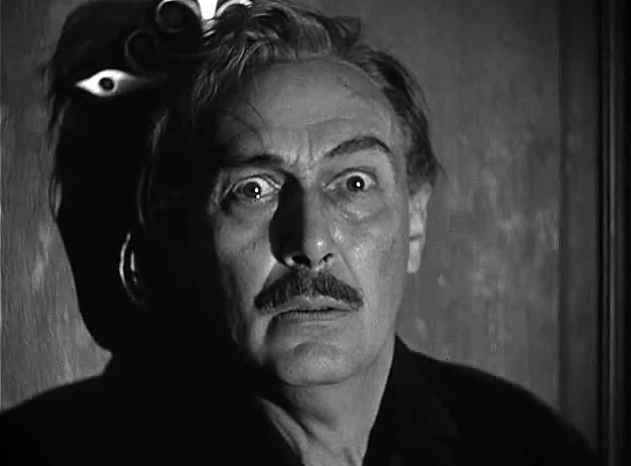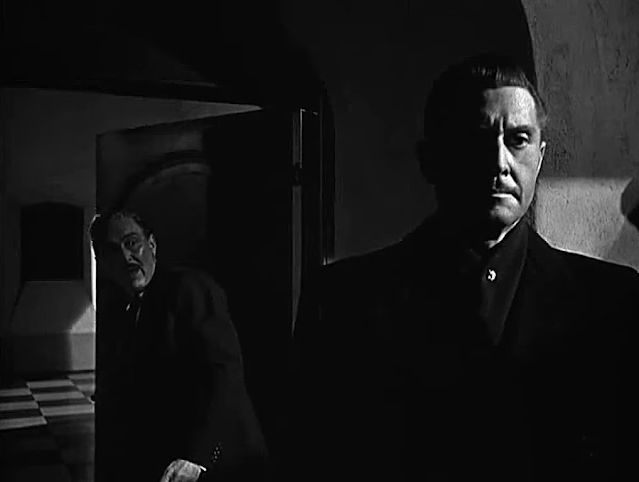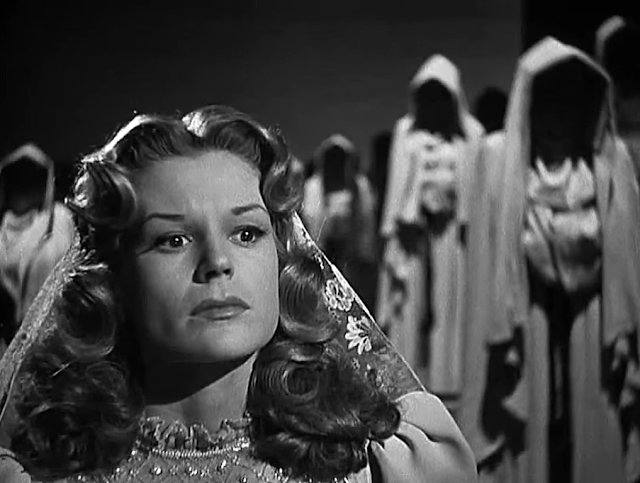
Address Unknown (1944) is a straight-up and fresh slice of anti-Nazi noir.
Straighter than most, because the one thing that Address Unknown is not, is a propaganda picture.
What Address Unknown (1944) serves instead is a more realistic and even intimate discussion of anti-Semitic behaviour under the Third Reich.
While still spinning with high velocity paranoia around the evils of Nazis and their totalitarian hatreds.
And Hitler is singled out, as is his anti-Jewish society which is presented in a rarely un-blinkered and un-varnished way.
The real hero of the film is K.T. Stevens, who plays Griselle Eisenstein — otherwise and more helpfully known on the stage as Griselle Stone.
She is the power, and her character is the prime mover in forcing out the massive quantities of paranoia created by the new German state.
Address Unknown (1944) tells the story of two men, whom are friends, and art dealers. For their variously bluffly explained reasons at the head of the film, one returns to Germany — by this time we should be calling it 'Nazi Germany' — or 'Hitler's Germany' — because the main of the action takes place here, in this oppressively drawn, oppressively violent, and Jew-hating society.
Nazi Germany is portrayed at times with hints of the expressionistic and formalised sets used by Fritz Lang, most especially in his second Mabuse picture.
The set up is gently acted, in a merry scene of bonhomie. The facts of the USA being superior in terms of values and freedoms, are not forced on the viewers, thankfully.
Instead, we see that Martin Schulz and Max Eisenstein (Morris Carnovsky) are good friends, German expatriate art dealers living in the United States. Martin's son Heinrich (Peter van Eyck) and Max's daughter Griselle (K.T. Stevens) are in love.
It's here back in Germany were the huge paranoia sets in. There are in fact literarlly gangs of eavesdropping Nazis in beer cellars, and a street campaign waged agsainst the unfortunate and ill-fatyed Jewish people.
In Germany, matters become worse when Martin meets Baron von Freische (Carl Esmond), joins the Nazi Party and becomes an important government official.
Martin eventually insists that Max stop writing to him as Max is Jewish. When Max sends him a hand-delivered letter to confirm he is not acting under duress, Martin makes it clear they are no longer friends.
When they come, the closing shots are devastating. In Address Unknown there is a sudden turn to the dark side, after the results of Griselle's rebellion at the theatre are felt, and she is punished.
It is Martin's fate that we become concerned with, and his paranoia after he finds himself in the position of betrayer. This is the fate of a man asked to chose death, or Nazi; and chooses Nazi. Martin lets himself down, as well as of course Griselle and her family, his best friends. And he can never live with the consequences, the relations that form under such fascism that provokes the public spying, surveillance, betrayal, and anti-Semitism.
 |
| Revenge of the weak? Peter van Eyck in Address Unknown (1944) |
That weakened male lead, played by Peter van Eyck, passive throughout the film, and often brooding in indecision, does commit the final act. He in fact unleashes the hell of the Nazis, in return for the betrayal; his plan is pretty clever, and entertaining too.
 |
| Nazi Terror! Mid-century totalitarian paranoia in Address Unknown (1944) |
The film noir feel is huge in Address Unknown, with shadows and silhouetted figures aplenty. Not only are the theatre sets used to great effect, to saturate the screen with even more expressionistic darkness, but the German house Martin and his wife and Griselle live in, is creepy, empty and like the offices and galleries, gateways and forests filmed throughout, seems to be built of dark and tapering perspectives, with featureless darkness, and shadowy walls, and other features.
 |
When it comes to the end, and Martin's wife and family have left him, it is just he and his paranoia. Every creaking floorboard is a Nazi. Even his baby is a Nazi; even if he and his wife seem rather old to be adding another sibling to his brood.
And it is clever how his son-in-law to be is manipulating the situation, to create this horror. We have passed through the anti-Semitism and into the pure fear of the totalitarian society. What better expression could therefore be made, than via the style of noir?
 |
| The Nazis are coming - - Film Noir Style Address Unknown (1944) |
Carl Esmond as baron von Friesche is an effective Nazi, who terrifies the hell out of Martin, and this is before he has even threatened him with the Gestapo. He stands for public ideology, Jew-hatred, public betrayal, manipulation, surveillance and torture, all in one package.
It's this peek into totalitarian methods that elevate Address Unknown far above the propaganda picture. It's everything that went into the fantasy of Orwell's 1984, but laid out and already working in 1930s Germany, and all very well evoked in 72 minutes
 |
| Paul Lukas and Carl Esmond Address Unknown (1944) |
The bravery and heroism in Address Unknown belongs to K.T. Stevens' character Griselle. It is Griselle who defies the Nazi censor and recites some certain Biblical lines on stage, causing an actual riot.
Her act of defiance is in high contrast to the dithering performance of Paul Lukas, as her boyfriend. Lukas' character seems unable to act at all, and appears very much the weakened male lead from the start of the picture.
 |
| K.T. Stevens, a heroine in the dark Address Unknown (1944) |
Unlike the film's audience, he is unable to see the peril faced by his fiancee, a Jewish woman living in Nazi Germany. And as soon as Nazi Germany gets wind of her real name — it is Eisenstein — not 'Stone' — she is forced in to a muddy, perilous and terrifying chase through the wilds — right out of theater-land and into farmland, which actually more resembles the trenches of World War One at times.
 |
| K.T. Stevens — one woman's defiance in Address Unknown (1944) |
Once into the swing of film noir it clearly became addictive as a style., For those that were able to compose the light of the darkness, stories of paranoia and betrayal were perfect. Not one opportunity is missed in fact to play with some shadows, and almost scream to the viewer that some bad people are emerging from them.
K.T. Stevens really gives it her all in this role. Her innocence and positivity is the perfect catalyst for the Nazis to do their thing, and when she is chased out of the theatre and into the night, this is a great sequences, which also does not end how we think it will end. In fact, it's almost as if a new film starts at this point.
K.T. Stevens was born in Los Angeles, the daughter of film producer and director Sam Wood. She made her first film appearance when she was just two years old in her father's second silent film, Peck's Bad Boy (1921).
As an adult, she changed her name to K.T. Stevens to distance herself from her father's fame. She initially called herself Katherine Stevens, which people often shorted to Katie, leading to the final version with the initials K.T.
















